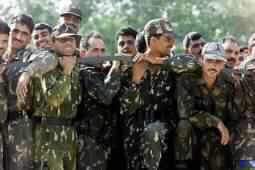HIGHLIGHTS: Islamabad Recalls Troops on Foreign Duty||Five Killed & 7 Wounded in Artillery Battles Thursday||International Leaders Launch Diplomatic Blitz on Both Countries||STORY: India rejected calls to engage Pakistan in talks over Kashmir, as Islamabad announced the recall of troops on foreign duty and Britain warned confrontation between the bitter rivals could escalate into nuclear war. (Read photo caption)
Fears of all-out warfare, meanwhile, wiped another 1.9 percent off the Bombay Stock Exchange, while Pakistan's main bourse remained shut Thursday to avert further heavy losses posted over the past four days.
On the frontlines, fierce artillery battles between Indian and Pakistani soldiers again raged in Kashmir, leaving at least another five people dead and several wounded on both sides.
Indian Prime Minister Atal Behari Vajpayee told a press conference in Kashmir's summer capital Srinagar that there was "no question" of holding talks with Pakistan until President Pervez Musharraf matched his words with deeds in reining in Islamic militants.
Asked if the two sides were close to war, he replied: "The situation is serious and it is a challenging situation, and we will meet the challenge."
He added cryptically: "We had said war clouds were hovering, but sometimes lightning strikes even if the weather is clear. We hope that the lightning will not strike."
The prime minister's comments come a day after he belligerently warned troops stationed in Kashmir's border areas to be ready for a "decisive fight".
The increasing war-talk on both sides linked to increased military mobilisation fuelled fears that India and Pakistan are lurching towards war, which British Foreign Secretary Jack Straw warned Thursday had the potential for igniting nuclear conflict.
"There is certainly a risk (of nuclear war)," Straw told BBC radio.
Pakistan, meanwhile, said Thursday it would pull troops from the Afghan border and recall soldiers from UN peacekeeping duties in Sierra Leone.
AN INTERNATIONAL DIPLOMATIC BLITZ ON BOTH COUNTRIES
Clearly alarmed at the escalating tension, international leaders have launched a diplomatic blitz on both countries.
US Secretary of State Colin Powell called Musharraf twice Thursday, an official close to the Pakistani president told AFP.
British Prime Minister Tony Blair had earlier pleaded with the nuclear-armed rivals to hold off a potentially disastrous conflict, while Washington said it had come up with specific ideas to defuse tensions between the two rivals.
European Union foreign affairs commissioner Chris Patten was due in New Delhi late Thursday after visiting Pakistan and Afghanistan, followed by Straw on Monday.
US Deputy Secretary of State Richard Armitage is expected in India and Pakistan in early June.
PHOTO CAPTION
Israeli policemen stand at the scene where a bomb attached to a tanker truck exploded at Israel's biggest fuel depot in the densely populated Tel Aviv metropolitan area, May 23, 2002. Suspected Palestinian militants tried to set ablaze a main Israeli fuel pumping depot hours after a suicide bomber killed two Israelis in a park full of chess and backgammon players. (Naor Rahav/Reuters)
- Author:
& News Agencies - Section:
WORLD HEADLINES


 Home
Home Discover Islam
Discover Islam Quran Recitations
Quran Recitations Lectures
Lectures
 Fatwa
Fatwa Articles
Articles Fiqh
Fiqh E-Books
E-Books Boys & Girls
Boys & Girls  Hajj Rulings
Hajj Rulings Hajj Fatwas
Hajj Fatwas














